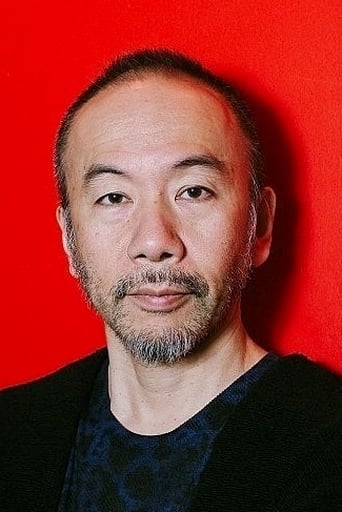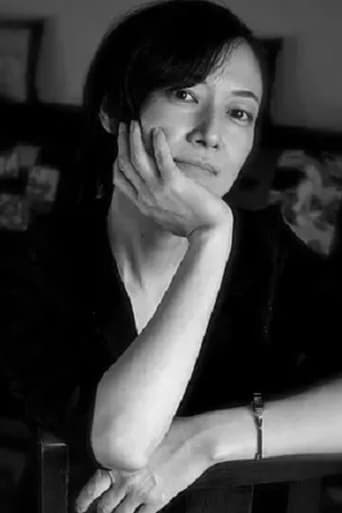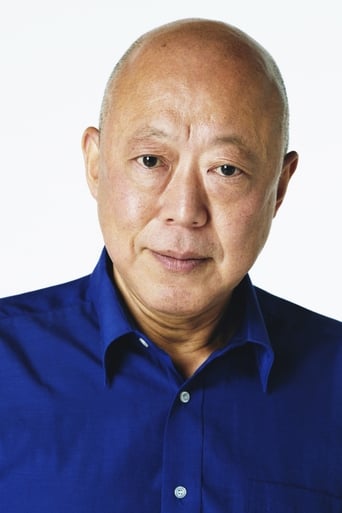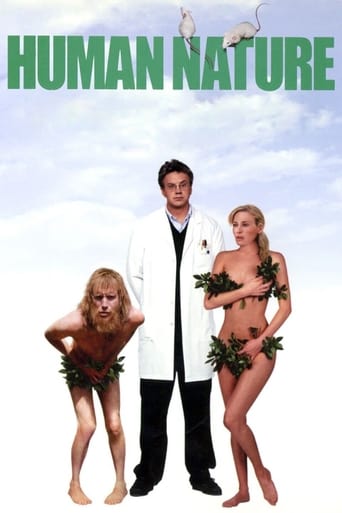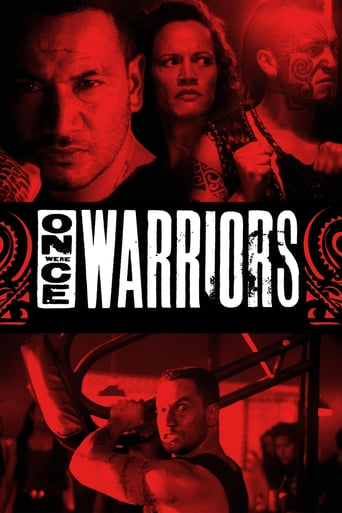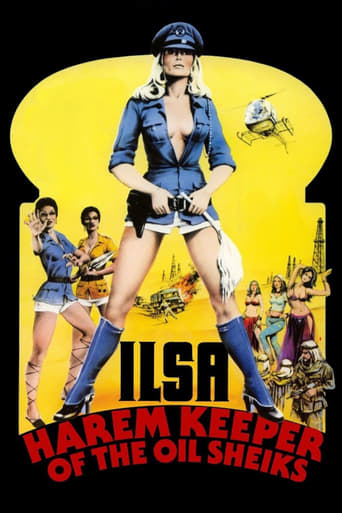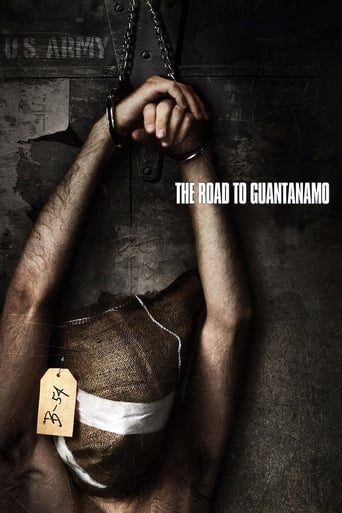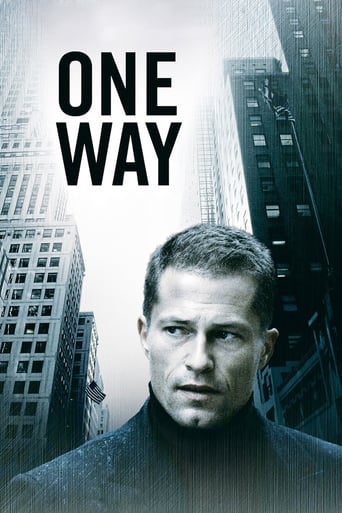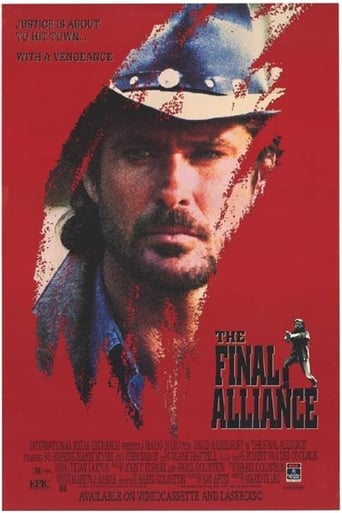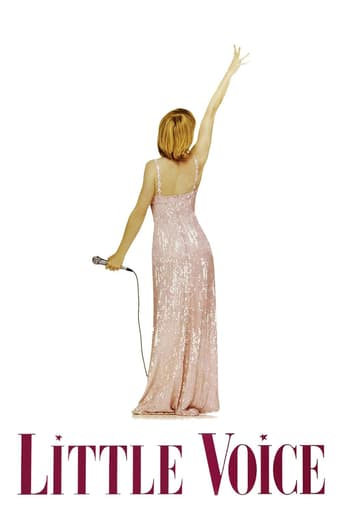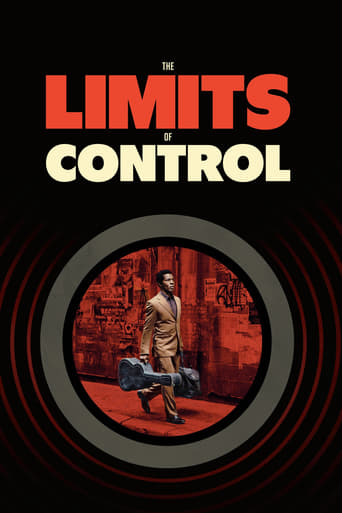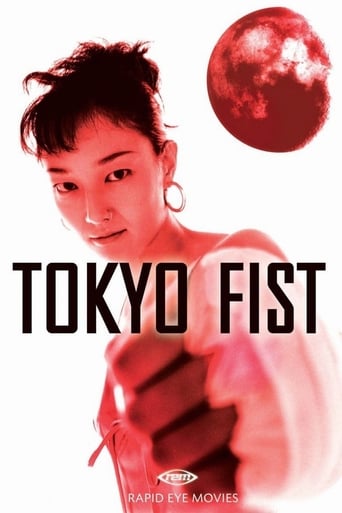
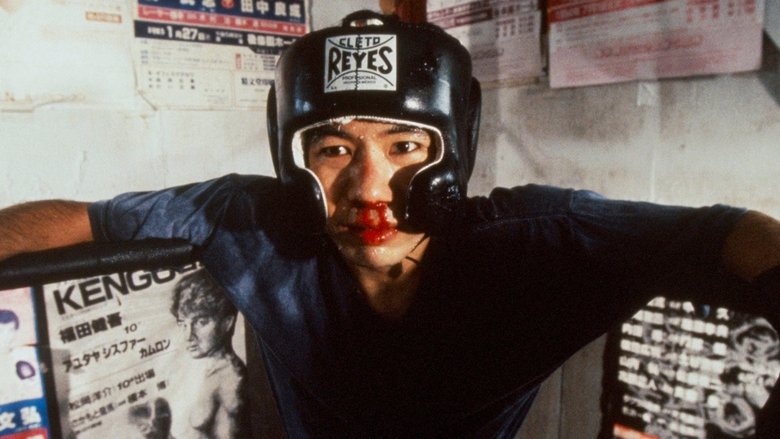
Tokyo Fist (1995)
A businessman, Tsuda, runs into a childhood friend, Kojima, on the subway. Kojima is working as a semiprofessional boxer. Tsuda soon begins to suspect that Kojima might be having an affair with his fiancée Hizuru. After an altercation, Tsuda begins training rigorously himself, leading to an extremely bloody, violent confrontation.
Watch Trailer
Cast


Similar titles
Reviews
It's Tokyo, the mid-Nineties and you fancy punching the poo-poo out of someone. That's how total cult directors Tsukamoto Shinya and Kitano Takeshi felt, at least. Coming a year apart - much like your mother's sex life - both made Tokyo-based films centred around boxing: 'Tokyo Fist' (1995) and 'Kids Return' (1996), both bringing their own unique flair to the art form. To start, the films are very similar: 'Tokyo Fist' starts with salaryman Tsuda bumping into an old school friend, Kojima, a part-time boxer. Likewise, 'Kids Return' begins with former best friends from school, Masaru and Shinji, happily bumping into each other on a Tokyo street, both recognising that their lives have taken a downward spiral since they last saw each other. However, due to the nature of both directors, the similarity largely ends there. 'Tokyo Fist' is very much along the lines of Tsukamoto's most famous work: 'Tetsuo: Ironman'. Focusing on ideas of revenge and aggression, Tsuda soon becomes paranoid that his old classmate might be knocking up his missus, Hizuru. His paranoia gradually drives Hizuru away, as their quiet life becomes loud, aggressive and full of blood-splattering scenes, with her ending up in the arms, and bed, of Kojima, played by Tsukamoto's brother, Koji. The anger and rage building inside him, exemplified by the ever-present loud music, Tsuda joins Koji's boxing gym, determined to beat him in the ring, much like Koji is doing to Hizuru. The film then becomes a loud, brash experience, with fast camera movements, editing and thrashing music, leaving the viewer out of breath just watching it. And, as ever, a confusion is created as to what exactly is going on, throwing in extreme moments to push things just that little further. Rage, obsession, and fetish are themes running throughout Tsukamoto's works, and 'Tokyo Fist' is no exception, working as a more polished version of 'Tetsuo: Ironman'. The special effects are still a little budget, but creative in the excessive blood pouring and Hizuru's new fetish for piercing any part of her body possible. Punch, punch, punch is the style for the boxing scenes, with Tsukamoto creating a work to seep into your mind and punch your brain into dazed confusion.But where Tsukamoto chooses to show graphic violence and gore, this is the very thing that Kitano often avoids. Since starting with 'Violent Cop', the violence is Kitano's films is more in the mind than on screen. The use of still cameras and editing means that actual acts of violence fall out of shot or are skipped for comic timing. The majority of punches thrown in 'Kids Return' are at punching bags or in sparring practise. 'Kids Return' is seen as Kitano's most autobiographical work, set in the part of Tokyo where he grew up and featuring events and job roles that he himself experienced while growing up. The two friends, Masaru and Shinji drift through school, seen as the ultimate prodigal sons by their teachers. Neither has much direction; simply wreaking havoc on the lives of their classmates. Meeting his match, Masaru decides to take up boxing, but soon realises he hasn't the discipline for the sport. His perennial sidekick, Shinji, however, does, and his talent is quickly spotted by the gym's coaches. Masaru then drifts away, becoming a low level yakuza.For Shinji, boxing is a sense of direction after days drifting, rather than an act of aggression. 'Kids Return' is all about direction when entering adulthood, mirroring roles taken by Kitano himself. Meek Hiroshi tries his hand at selling scales and driving a taxi on finishing school - two jobs Kitano had - but soon finds that neither provide him with what he wants out of life. Two students forming a school double act perform stand-up comedy to their classmates with a manzai act similar to that brought Kitano his initial fame. If anything, 'Kids Return' is quite a depressing film. On leaving school, hopes and ambitions are quickly lost for all characters, with all left feeling lost and abandoned by their seniors. Hiroshi is repeatedly criticised by the bosses of his various jobs; Masaru is expelled from his yakuza family for speaking out of turn; and Shinji's coaches give up on him once he is led astray by an older boxer who takes him drinking. The boxing in 'Kids Return' is exactly that: there is more emphasis on the sport, with more realistic bouts and styles. 'Tokyo Fist' goes down the Stallone-form of boxing with non-stop punch fests that would lead to permanent brain damage in seconds, but with blood spurting out of eye sockets, this is the only way Tsukamoto of the Nineties would work. Both made in the mid-Nineties, set in Tokyo and with boxing as a key element, the films are very different. Tsukamoto favours high-octane fight scenes and special effects to create a visually spectacular gore fest, while Kitano chooses a more mellow-paced drama. At a time when two former boxing film legends return for the undoubtedly terrible 'Grudge Match', 'Tokyo Fist' and 'Kids Return' are both blasts from the past that fall under the same weight class, but see a clash of styles.
This is not a movie you experience with the brain, rather it's an assault on the senses. Some of my favourite cinema does that, and I'm always on the lookout for movies that call us to live through a certain experience, to vicariously sense the world as another person might. The ultimate joy is for me to be able to take out something that matters, an otherwise impossible view of the world in my livingroom that makes sense.The problem of Tokyo Fist is that it's packed with so much rage and annihilation yet aims it nowhere. The boxer characters are punching, but they're not punching outwards, at society, nor inwards at the soul, they're simply pummeling and being pummeled senseless. Senseless is an apt word here, for in Tokyo Fist the mind doesn't matter, and the human body is something to be destroyed, the senses torn from it and thrown in a bloody heap on a grimy floor. Tsukamoto can be seen beating his head in a bloody pulp against a wall, but that wall signifies nothing. The spurts of blood gushing from broken noses and deformed bonecheeks, the film celebrates with the comic verve of Sam Raimi.With time Tsukamoto would grow out of the techno angst of this period, but enabling the maturity of films like Vital, a certain youthful vitality had to be sacrificed in the process. I lament this because few directors dare make films like his, even Tsukamoto himself doesn't seem able to make them anymore.Fits of jealousy, miserable love triangles, personality changes, all these are trifle story points. What I take from Tokyo Fist is the aimlessness of violence, taken to the extreme because there's nothing to absorb it. Likely Tsukamoto grew up in a Japanese society of the 80's and 90's, like the rest of the world, stifled in the mire of apathy and complacency. People had the money to buy and the selection to buy from, but not the struggle with grand ideals. The resulting New Wave of his cinema is a New Wave of disillusionment turned against itself, a shell without a solid core to make it dream a better society.In this light, it makes sense to see Tsukamoto playing a young employee, fresh out of high school and already into a suit and a tie running errands for a faceless corporation, turning into a crazed animal for whom even love is a petulant obsession, another passing need to be consummated.
I can't believe what other people are writing about this. DON'T BELIVE THEM. I rented this movie, almost bought it, and wanted a refund. I guess I had false expectations. Fight Club was amazing to me and I wanted some more. Too bad the most exciting aspect to Tokyo Fist was the box art.The movie's interesting plot was a whole love triangle between a boxer, his friend, and the friend's wife. The friend/geek becomes a boxer to win his girl back. The wife turns from housewife to Freaky, S&M psycho. Sounds great but nothing came together right for me. The movie is slow with the use of long shots throughout the film that just put me asleep. In terms of violence, it was pretty tame with cheesy effects. I like cheesy over-the-top violence but this was pretty sorry and sparse. I have seen better action scenes then this even on 80's American Action movies. If you are expecting action or a deep thought provoking experience, look for something else. People call it a masterpiece, but I am wondering if I rented the same movie that I did.The only way you can truly judge this film is watching it yourself. Be prepared for a serious letdown.I don't usually do this, but I felt the need to warn people about this much often overhyped movie.
Shinya Tsukamoto is one of the most original directors to date. He's sick, he's twisted, and he's entirely original. I saw Tetsuo, his most famous film, this past January. Now I consider it a masterpiece. It was maybe the only movie that made me scream out loud because of the horror presented. Then this past week I found Tetsuo II: Body Hammer, and found it almost as ingenious as the first. Now I have seen the third of three of his films which has been released on video in the United States: Tokyo Fist.In plot, it is little different than Rocky. Just add a love triangle subplot. But in style, it is quite an amazing film. It's enough to break you. I don't think it's as good as the Tetsuo films, but it is an original and great film. 8/10


